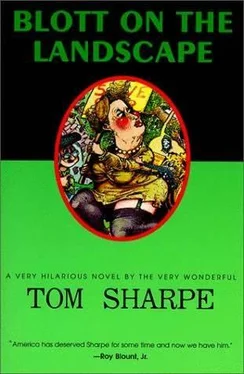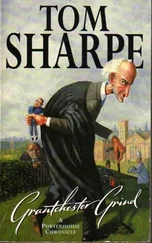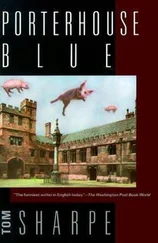Tom Sharpe - Blott on the Landscape
Здесь есть возможность читать онлайн «Tom Sharpe - Blott on the Landscape» весь текст электронной книги совершенно бесплатно (целиком полную версию без сокращений). В некоторых случаях можно слушать аудио, скачать через торрент в формате fb2 и присутствует краткое содержание. Жанр: Современная проза, на английском языке. Описание произведения, (предисловие) а так же отзывы посетителей доступны на портале библиотеки ЛибКат.
- Название:Blott on the Landscape
- Автор:
- Жанр:
- Год:неизвестен
- ISBN:нет данных
- Рейтинг книги:5 / 5. Голосов: 1
-
Избранное:Добавить в избранное
- Отзывы:
-
Ваша оценка:
- 100
- 1
- 2
- 3
- 4
- 5
Blott on the Landscape: краткое содержание, описание и аннотация
Предлагаем к чтению аннотацию, описание, краткое содержание или предисловие (зависит от того, что написал сам автор книги «Blott on the Landscape»). Если вы не нашли необходимую информацию о книге — напишите в комментариях, мы постараемся отыскать её.
Blott on the Landscape — читать онлайн бесплатно полную книгу (весь текст) целиком
Ниже представлен текст книги, разбитый по страницам. Система сохранения места последней прочитанной страницы, позволяет с удобством читать онлайн бесплатно книгу «Blott on the Landscape», без необходимости каждый раз заново искать на чём Вы остановились. Поставьте закладку, и сможете в любой момент перейти на страницу, на которой закончили чтение.
Интервал:
Закладка:
Blott ate his cereal in silence. There didn’t seem much point in telling her about his part in the power failure and besides she seemed in a talkative mood herself.
“The trouble with Giles was,” she said using the past tense in a way that Blott found most agreeable, “that he liked to think of himself as a self-made man. I have always thought it an extremely presumptuous phrase and in his case particularly inappropriate. I suppose he had some right to call himself a man, though from my experience of him I wouldn’t have said virility was his strong point, but as for being self-made, he was nothing of the kind. He made his money, and of course that’s what he meant by self, by speculating in property, by evicting people from their homes and by obtaining planning permission to put up office blocks. At least my family made its money selling beer, and very good beer at that. And it took them generations to do it. There’s nothing so splendid about that but at least they were honest men.” She was still talking and doing the washing-up when Blott left to go out to the kitchen garden.
“Is there anything else you want done about him?” he asked as he left.
Lady Maud shook her head. “I think we can just leave nature to take its course,” she told him. “He was a great believer in the law of the jungle.”
In Worford Police Station Dundridge was having difficulty with the law of the land. Hoskins had been no great help.
“According to him,” said the Superintendent in charge of the case, “you gave specific orders for random sorties to be made by bulldozers on various properties. Now you say you didn’t.”
“I was speaking figuratively,” Dundridge explained. “I certainly didn’t give any instructions that could lead anyone but a complete idiot to suppose that I wanted the late Mr Bullett-Finch’s house demolished.”
“Nevertheless it was demolished.”
“By some lunatic. You don’t seriously imagine I went out there and smashed the house up myself?”
“If you’ll just keep calm, sir,” said the Superintendent, “all I am trying to do is to establish the chain of circumstances that led up to this murder.”
“Murder?” mumbled Dundridge.
“You’re not claiming it was an accident, are you? A person or persons unknown deliberately take a large crane and use it to pulverize a house in which two innocent people are sleeping. You can call that all sorts of things but not an accident. No sir, we are treating this as a case of murder.”
Dundridge thought for a moment. “If that’s the case there must have been a motive. Have you given any thought to that?”
“I’m glad you mentioned motive, sir,” said the Superintendent. “Now I understand that Mr Bullett-Finch was an active member of the Save the Gorge Committee. Would you say that your relations with him were marked by an unusual degree of animosity?”
“Relations?” shouted Dundridge. “I didn’t have any relations with him. I never met the man in my life.”
“But you did speak to him over the telephone on a number of occasions.”
“I may have done,” said Dundridge. “I seem to remember his phoning once to complain about something or other.”
“Would that have been the occasion on which you told him that quote ‘If you don’t stop pestering me I’ll see to it that you’ll lose a bloody sight more than a quarter of an acre of your bleeding garden’ unquote?”
“Who told you that?” snarled Dundridge.
“The identity of our informant is irrelevant, sir. The question is did you or did you not say that.”
“I may have done,” Dundridge admitted, promising that he would make Hoskins’ life difficult for him in future.
“And wouldn’t you agree that the late Mr Bullett-Finch has in fact lost more than a quarter of an acre of his bleeding garden?”
Dundridge had to admit that he had.
As the morning wore on the Controller Motorways Midlands had the definite impression that a trap was closing in around him.
In Sir Giles’ case there was the absolute conviction. His attempts to scale the wire fence had failed miserably. Oily gumboots were not ideal for the purpose and Sir Giles’ physical activities had been of too passive a nature to prepare him at all adequately for scrambling up wire mesh or coping with barbed-wire overhangs. What he needed was a ladder, but his only attempt to leave the pinetum to look for one had been foiled by the sight of a rhinoceros browsing in the rockery and of a lion sunning itself outside the kitchen door. Sir Giles stuck to the pinetum and waited for an opportunity. He waited a long time.
By three o’clock in the afternoon he was exceedingly hungry. So were the lions. From the lower branches of a tree overlooking the park Sir Giles watched as four lionesses stalked a giraffe, one moving upwind while the other three lay in the grass downwind. The giraffe moved off and a moment later was thrashing around in its death throes. From his eyrie Sir Giles watched in horror as the lionesses finished it off and were presently joined by the lions. Stifling his disgust and fear Sir Giles climbed down from the branch. This was his opportunity. Ignoring the rhinoceros which had its back to him he raced across the lawn towards the house as fast as his gum-boots would allow. He reached the terrace and hurried round past the conservatory where Lady Maud was watering a castor-oil plant. As he ran past she looked up and for a moment he had an impulse to stop and beg her to let him in but the look on her face was enough to tell him he would be wasting his time. It expressed an indifference to his fate, almost an ignorance of his existence, which was in its way even more frightening than Blott’s terrible smile. As far as Maud was concerned he simply wasn’t there. She had married him to save the Hall and preserve the family. And now she was prepared to murder him by proxy for the same purpose. Sir Giles had no doubt about that. He ran on into the yard and opened the garage door. Inside stood the Bentley. He could get away at last. He pushed the doors back and got into the car. The keys were still in the ignition. He turned them and the starter whirred. He tried again but the car wouldn’t start.
In the kitchen garden Blott listened to the engine turning over. He was wasting his time. He could go on till Doomsday and the car wouldn’t start. Blott had no sympathy for him. “Nature must take its course,” Lady Maud had said and Blott agreed. Sir Giles meant nothing to him. He was like the pests in the garden, the slugs or the greenfly. No that wasn’t true. He was worse. He was a traitor to the England that Blott revered, the old England, the upstanding England, the England that had carved an Empire by foolhardiness and accident, the England that had built this garden and planted the great oaks and elms not for its own immediate satisfaction but for the future. What had Sir Giles done for the future? Nothing. He had desecrated the past and betrayed the future. He deserved to die. Blott took his shotgun and went round to the garage.
Lady Maud in the conservatory was having second thoughts. The look on Sir Giles’ face as he hesitated outside had awakened a slight feeling of pity in her. The man was afraid, desperately afraid, and Lady Maud had no time for cruelty. It was one thing to talk in the abstract about the law of the jungle, but it was another to participate in it.
“He’s learnt his lesson by now,” she thought, “I had better let him go.” And she was about to go out and look for him when the phone rang. It was General Burnett.
“It’s about this business of poor old Bertie,” said the General. “The committee would like to come over and have a chat with you.”
“Bertie?” said Lady Maud. “Bertie Bullett-Finch?”
“You know he’s dead, of course,” said the General.
Читать дальшеИнтервал:
Закладка:
Похожие книги на «Blott on the Landscape»
Представляем Вашему вниманию похожие книги на «Blott on the Landscape» списком для выбора. Мы отобрали схожую по названию и смыслу литературу в надежде предоставить читателям больше вариантов отыскать новые, интересные, ещё непрочитанные произведения.
Обсуждение, отзывы о книге «Blott on the Landscape» и просто собственные мнения читателей. Оставьте ваши комментарии, напишите, что Вы думаете о произведении, его смысле или главных героях. Укажите что конкретно понравилось, а что нет, и почему Вы так считаете.












